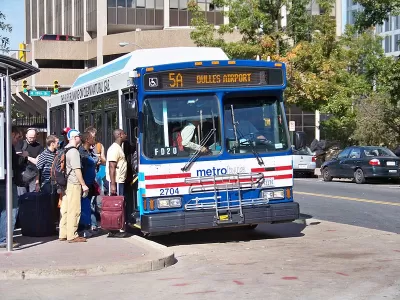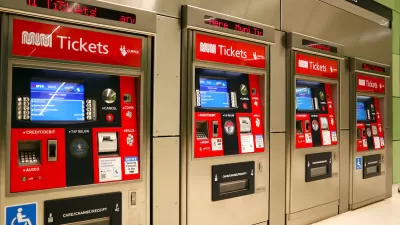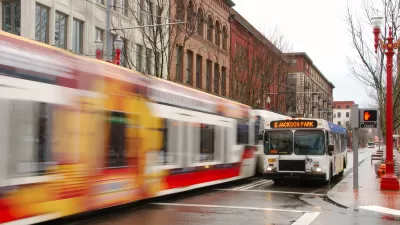Pitting Washington, D.C.’s K Street Transitway against free transit oversimplifies a more complex issue.

A proposal to provide free transit service in lieu of a new multimodal transitway in Washington, D.C. sparked heated debate among transit advocates, but now the District’s transit users may not get either one, writes George Kevin Jordan in Streetsblog USA.
“In late April, two members of the D.C. Council grabbed headlines when they proposed scrapping the multimodal, $123-million K Street Transitway project — a long-fought road redesign which would prioritize bus service by featuring two separated bus lanes between 12th Street NW to 21st Street NW, among other multimodal improvements — and re-allocate its funding towards an initiative called Metro for D.C., allowing people to board a bus within District limits for free, no matter the final destination.”
Now, a request from Washington Metropolitan Area Transit Authority (WMATA) board Chair Paul Smedberg to delay the free transit program prompts questions as to whether any transit improvements will be made at all. Jordan points out that the service-vs.-free fares debate misses the point, pointing out that it isn’t a question of a simple tradeoff.
Rather, each initiative comes with its own set of challenges and associated opportunities: “Under the surface of the debate are budgetary concerns for both the city and the WMATA, design concerns about the Transitway that some say would undermine its multimodal goals,” while the legislation that would fund the free fares program would also increase transit service. For now, “With D.C.’s budget still to be voted on, the future of both K-Street and Metro for D.C. seem to be up in the air.”
FULL STORY: D.C.’s ‘Free Fares Vs. Good Service’ Debate Isn’t What You Think

Maui's Vacation Rental Debate Turns Ugly
Verbal attacks, misinformation campaigns and fistfights plague a high-stakes debate to convert thousands of vacation rentals into long-term housing.

Planetizen Federal Action Tracker
A weekly monitor of how Trump’s orders and actions are impacting planners and planning in America.

In Urban Planning, AI Prompting Could be the New Design Thinking
Creativity has long been key to great urban design. What if we see AI as our new creative partner?

King County Supportive Housing Program Offers Hope for Unhoused Residents
The county is taking a ‘Housing First’ approach that prioritizes getting people into housing, then offering wraparound supportive services.

Researchers Use AI to Get Clearer Picture of US Housing
Analysts are using artificial intelligence to supercharge their research by allowing them to comb through data faster. Though these AI tools can be error prone, they save time and housing researchers are optimistic about the future.

Making Shared Micromobility More Inclusive
Cities and shared mobility system operators can do more to include people with disabilities in planning and operations, per a new report.
Urban Design for Planners 1: Software Tools
This six-course series explores essential urban design concepts using open source software and equips planners with the tools they need to participate fully in the urban design process.
Planning for Universal Design
Learn the tools for implementing Universal Design in planning regulations.
planning NEXT
Appalachian Highlands Housing Partners
Mpact (founded as Rail~Volution)
City of Camden Redevelopment Agency
City of Astoria
City of Portland
City of Laramie





























